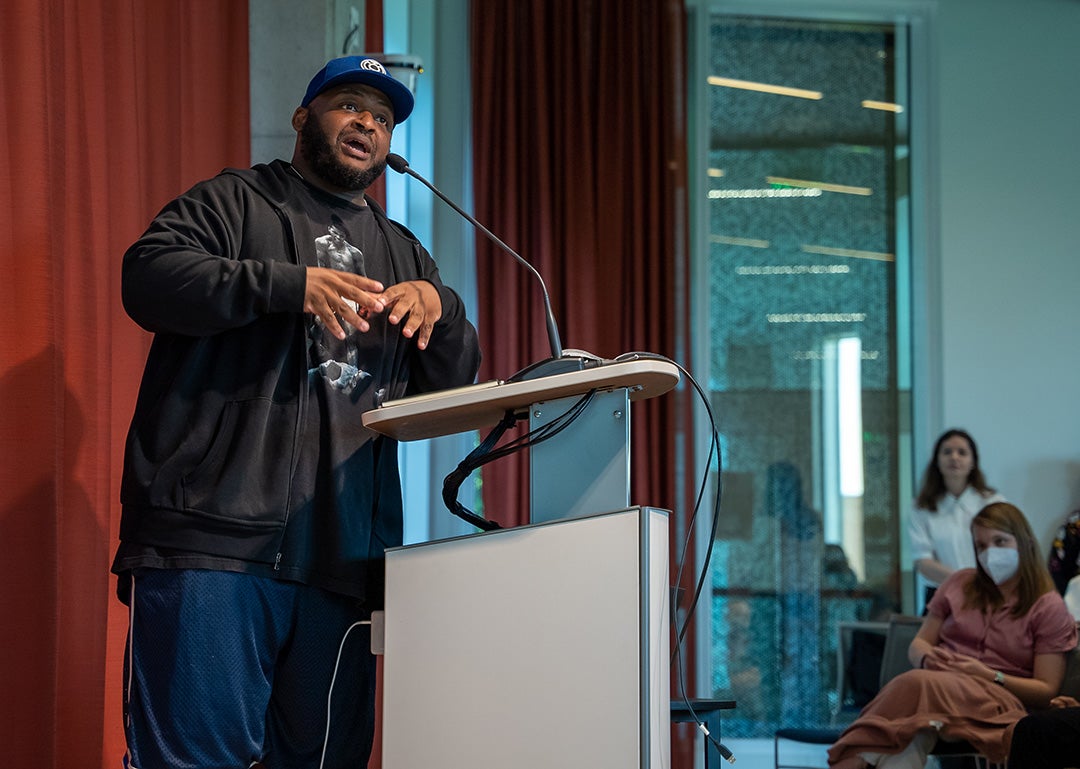
When students at Rice University sign up for Verses/Versus, a creative writing course taught by acclaimed author and the Libbie Shearn Moody Professor of Creative Writing and English Kiese Laymon, they know they’re not getting a traditional literature class. What they may not realize is how deeply the syllabus will pull them into the cultural and political dynamics already happening in their group chats, social feeds and Spotify algorithms.
Verses/Versus changes its focus each time it’s offered, comparing iconic artists and albums across eras. In previous semesters, students studied the confessional tension between Lauryn Hill’s “The Miseducation of Lauryn Hill” and Kendrick Lamar’s “good kid, m.A.A.d city” or examined Jay-Z’s “4:44” alongside Lamar’s “Mr. Morale & the Big Steppers.” But for fall 2025, Laymon is breaking new ground with a course that centers on the beef between Lamar and Drake, a cultural moment that’s still reverberating in real time.
“There’s no telling what will happen from the time that course was put on the books to when we listen to ‘Like That’ or ‘First Person Shooter’ again,” Laymon said.

The long-simmering tension between Drake and Lamar erupted into an unprecedented rap battle in spring 2024 with both artists releasing a flurry of diss tracks including Drake’s “Family Matters” and Lamar’s “Not Like Us,” which captivated fans and critics alike. What began as lyrical jabs escalated into a cultural showdown, touching on issues of authenticity, artistry, masculinity and regional pride. As the beef played out across streaming platforms and social media, it sparked passionate debate about what defines greatness in hip-hop and who gets to claim it. That shifting dynamic is exactly what draws Laymon to the subject and what makes the class such a challenge and thrill for students.
“No matter what you put on the syllabus, the syllabus necessarily has to change because the artist is releasing music that shifts how the artist is viewed in the world and how the students view the artist,” Laymon said.
Though the course may be rooted in pop culture, Laymon makes it clear it isn’t about gossip or fan loyalty. It’s about aesthetics and how style, race, gender, geography and power shape both performance and perception. In Laymon’s words, “It’s United States versus Canada. It’s everything.”
Laymon traces the course’s origin to a version he once taught comparing major political and literary figures at Vassar College.
“It was a course that was looking at political contestation, particularly African Americans in the 20th century,” Laymon said. “We explored Malcolm X versus Martin Luther King, ‘Their Eyes Were Watching God’ versus ‘Invisible Man.’”
Over time, student fascination with the music components of those classes nudged the course in a new direction.

“What I want to do is locate those opinions in the aesthetic choices that both of those artists make and how we consume their work,” Laymon said. “Ultimately, when you have these sort of performative battles, I’m thinking about how we as the public decide who wins.”
This kind of classroom inquiry is deeply personal for Laymon, whose award-winning work including the memoir “Heavy” and the novel “Long Division” is known for interrogating the emotional and political weight of confession, repair and resistance.
“I just really love to see where (students) are with art consumption,” he said. “Ultimately, the course is about how you work with what you value. I’m interested in how you wrap words around the substantiation of your claim.”
For students, that means defending aesthetic judgments with rigor and intention and without cliché.
“I want you to be able to find me the word to describe what you actually think and feel about a particular kind of art and artistry,” Laymon said.
He said he sees the course as a site of collaborative discovery, where students expand the very definition of what a college classroom can be.
“They teach each other and they expand the confines of what they think any classroom should be — much less a Rice classroom,” he said. “It’s always different for me, and selfishly, I appreciate that.”
At a time when cultural discourse often plays out in viral clips and streaming stats, Verses/Versus offers something else: a space to slow down, dig deeper and engage critically with the music students already love. It’s a class that meets students where they are — headphones on, minds open.

